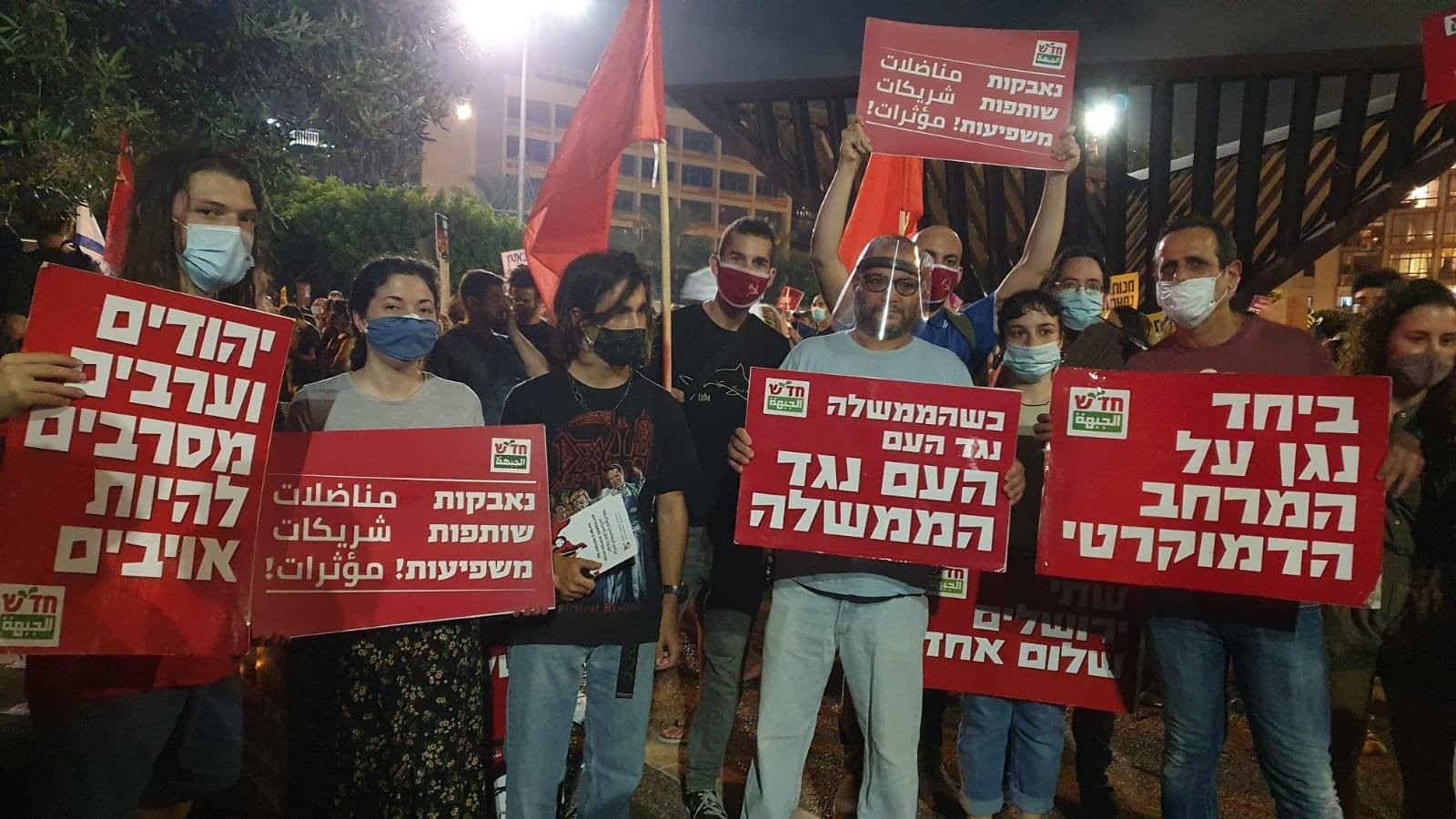Many thousands of demonstrators, estimates range between 10-30,000, descended on Rabin Square in Tel Aviv on Saturday evening, July 11, to noisily protest the Israeli far-right government’s ineffectual handling of the economic crisis caused by the ongoing coronavirus pandemic, in particular the inadequate financial aid being offered to the unemployed, small business owners and independent professionals. (Mid- to large businesses and banks received governmental assistance almost from the very start of the pandemic.)
Police initially said they would restrict the number of participants in Saturday evening’s protest to 1,800, but ultimately widened the area set aside for the gathering to accommodate a much larger crowd. At the conclusion of the main demonstration in Rabin Square to protest the neo-liberal government’s economic policies, several hundred participants blocked traffic and clashed with police at several locations, including along the city’s Ibn Gabirol Street, Rothschild Boulevard and the Azrieli intersection. Scuffles between cops and protesters erupted as hundreds chanted “Bibi Go Home,” referring to the prime minister by his nickname. Mounted police were deployed and pepper spray was utilized liberally to disperse crowds. A total of 20 demonstrators were arrested.

Activists and supporters of Hadash, among them MK Ofer Cassif (fourth from left), demonstrate against the neoliberal handling of the coronavirus economic crisis by Israel’s far-right government, Saturday night, July 11, at Rabin Square in Central Tel Aviv. From right to left the Hadash placards read” “Together we’ll defend the democratic space”; “When the government is against the people, the people are against the government”; “Struggling, Participating and Influencing”; “Jews and Arabs refuse to be enemies.” (Photo: Zu Haderech)
Among the participants in the Rabin Square protest were activists from Hadash and the Communist Party of Israel. “We’re talking about workers and unemployed who are becoming more and more desperate and angry, and who feel, rightly so, that the country has deserted them during their most difficult hour. Netanyahu and his far right government must go home,” said Hadash MK Ofer Cassif (Joint List) to journalists during the demonstration.
Persons who earn their livelihoods from a number of economic sectors took part in Saturday’s demonstration, including furloughed salaried workers, unemployed, owners of hard-hit small businesses, freelancers and independent workers, members of the entertainment industry and of the restaurant and hospitality sector, as well as university students. Student unions said they were taking part in the event to show their concern at the large numbers of young people made jobless by business closures.
While the organizers said the demonstration would be non-partisan, with no party politicians addressing the demonstrators, Hadash placards calling upon Prime Minister Benjamin Netanyahu to resign, bearing slogans against the corrupt leader, and red flags were spotted throughout the crowd.
Addressing the thousands participating in the protest, Ahinoam Nehmad, the owner of a domestic tourism company, said: “The fight began with the lock-down and continued with our not receiving fair compensation. We are fighting for the present, for our livelihoods, for our dignity as human beings – and that is no bullshit,” said Nehmad in what appeared to be a dig at Likud minister without portfolio Tzachi Hanegbi, who last week dismissed as “bullshit” claims that unemployed do not have enough money to feed their families amidst the economic crisis.
The Rabin Square protest and one by striking social workers near Jerusalem were augmented Saturday evening by the regularly held protest by the “Black Flag” movement that was founded last year to protest the political leadership of Israel’s indicted prime minister. Series of “Black Flag” protests took place across the country on Saturday evening for the third consecutive week, with thousands of protesters from the movement gathering at some 170 of the country’s largest overpasses and intersections from Kiryat Shmona in the North to Eilat in the South. In Tel Aviv’s in Rabin Square, “Black Flag” activists covered their heads in black cloth as a sign of mourning over the demise of Israel’s democracy at the hands of a government whose head has been indicted and is currently on trial for corruption and breach of trust.
On Thursday night, July 9, Netanyahu appeared on television to present his government’s latest economic assistance program to the self-employed and small business owners, in which he promised them an immediate grant of up to NIS 7,500 per month, or just a little more than $2,100. The monthly minimum wage in Israel is NIS 5,300 ($1,530). Note that other than covering living expenses, no significant government-sponsored allocations have been made until now to help these independents pay their business-related outlays.
Attempts by Netanyahu to prevent the Saturday evening rally in Tel Aviv – by meeting with some representatives of the self-employed on Friday afternoon – did not go far enough to assuage their anger, frustration and disappointment due to the government’s procrastination in delivering on all its promises of compensation since the outbreak of the coronavirus.
Netanyahu is justifiably concerned that Saturday evening’s mass demonstration may become just the first what will prove to be an intensified and growing struggle that might only subside with the resignation of the current government. About 850,000 of formerly salaried workers are still unemployed in Israel, around 20 percent of the country’s workforce. These figures do not include tens of thousands of self-employed and small business owners, whose livelihoods have been severely impacted by the ongoing economic crisis.
Related:


